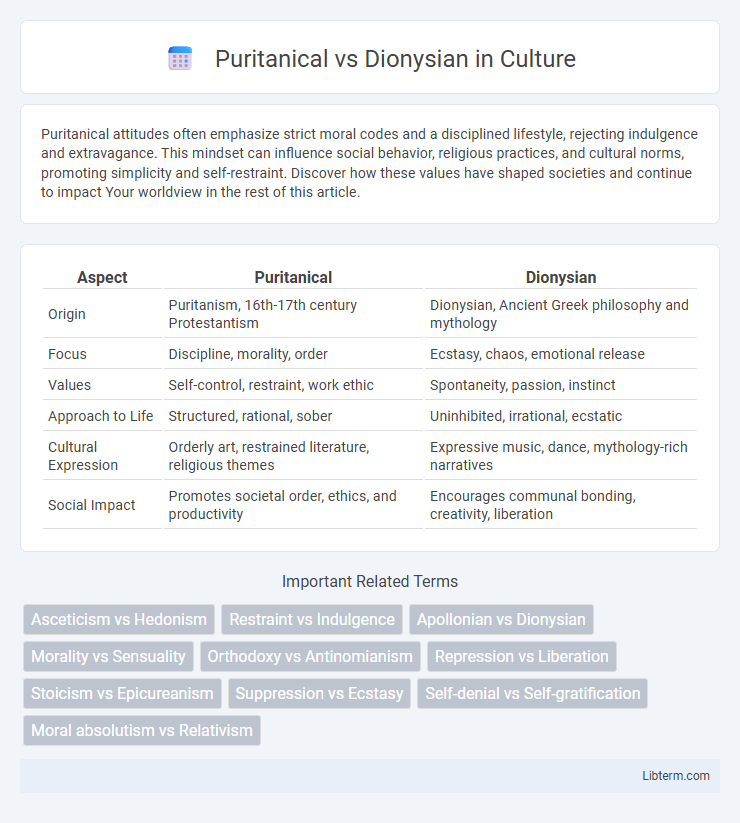Puritanical attitudes often emphasize strict moral codes and a disciplined lifestyle, rejecting indulgence and extravagance. This mindset can influence social behavior, religious practices, and cultural norms, promoting simplicity and self-restraint. Discover how these values have shaped societies and continue to impact Your worldview in the rest of this article.
Table of Comparison
| Aspect | Puritanical | Dionysian |
|---|---|---|
| Origin | Puritanism, 16th-17th century Protestantism | Dionysian, Ancient Greek philosophy and mythology |
| Focus | Discipline, morality, order | Ecstasy, chaos, emotional release |
| Values | Self-control, restraint, work ethic | Spontaneity, passion, instinct |
| Approach to Life | Structured, rational, sober | Uninhibited, irrational, ecstatic |
| Cultural Expression | Orderly art, restrained literature, religious themes | Expressive music, dance, mythology-rich narratives |
| Social Impact | Promotes societal order, ethics, and productivity | Encourages communal bonding, creativity, liberation |
Understanding Puritanical and Dionysian: Definitions
Puritanical refers to a strict adherence to moral codes, self-discipline, and restraint often rooted in religious or cultural values emphasizing order and sobriety. Dionysian embodies spontaneity, emotional excess, and indulgence in pleasures, representing chaos, creativity, and freedom from conventional norms. These terms originate from contrasting philosophical concepts introduced by Friedrich Nietzsche to describe the duality of human nature and cultural expressions.
Historical Roots of Puritanical Thought
Puritanical thought originated in 16th- and 17th-century England during the Protestant Reformation, driven by Calvinist theology emphasizing discipline, moral rigor, and predestination. The Puritans sought to purify the Church of England from Catholic practices, promoting a worldview centered on self-control, austerity, and work ethic as reflections of divine favor. This ideology contrasted sharply with the Dionysian ethos, which celebrates chaos, ecstasy, and liberation from social constraints rooted in ancient Greek spiritual traditions.
The Dionysian Spirit: Origins and Influence
The Dionysian spirit originates from ancient Greek mythology, embodying chaos, passion, and unrestrained creativity linked to the god Dionysus. This spirit influences artistic expression by encouraging emotional freedom, ecstasy, and the breaking of societal norms. Its impact is evident in literature, theater, and modern cultural movements that celebrate spontaneity and the primal aspects of human nature.
Moral Restraint vs Ecstatic Freedom
Puritanical values emphasize strict moral restraint, advocating self-discipline, order, and the suppression of desires to maintain social and personal purity. In contrast, the Dionysian perspective celebrates ecstatic freedom, encouraging uninhibited expression, emotional release, and the embrace of chaos as a pathway to deeper truth and vitality. The tension between Puritanical rigidity and Dionysian exuberance reflects fundamental conflicts in human culture regarding control and liberation.
Societal Impacts: Order or Chaos?
Puritanical values emphasize strict social order, discipline, and moral rigidity, fostering stability and predictability within societies but often at the cost of individual freedom and creativity. Dionysian influences celebrate emotional expression, spontaneity, and chaos, promoting cultural innovation and personal liberation while potentially undermining social cohesion and structured governance. The dynamic tension between these forces shapes societal development by balancing conformity and rebellion, control and liberty, leading to cycles of cultural renewal or conflict.
Puritanical Values in Modern Culture
Puritanical values in modern culture emphasize discipline, self-control, and moral rigor, often manifesting in work ethics that prioritize productivity and restraint. These values shape social norms around modesty, responsibility, and the rejection of excess or hedonistic behaviors. Contemporary movements promoting minimalism, sobriety, and ethical consumerism reflect the enduring influence of Puritanical principles in shaping individual and collective lifestyles.
The Allure of the Dionysian in Art and Life
The allure of the Dionysian in art and life lies in its celebration of passion, chaos, and ecstatic experiences that break free from Puritanical restraint and rigidity. This embrace of the irrational and emotional fosters creativity, spontaneity, and a profound connection to primal instincts, making it a powerful force in artistic expression and human experience. Through music, dance, and visual arts, the Dionysian element challenges societal norms and invites immersion in the vitality and unpredictability of existence.
Psychological Perspectives: Discipline vs Indulgence
Puritanical psychology emphasizes disciplined self-control, restraint, and adherence to moral codes, fostering a structured mental framework that promotes order and long-term goal attainment. Dionysian psychology, in contrast, encourages emotional expression, spontaneity, and indulgence in pleasures, highlighting the importance of embracing instincts and unconscious desires for psychological vitality. Balancing these opposing forces can lead to a more integrated personality, allowing individuals to navigate between restraint and fulfillment effectively.
Conflict and Reconciliation Between the Two
The conflict between Puritanical restraint and Dionysian exuberance arises from their contrasting values of order versus chaos, discipline versus indulgence, and reason versus emotion. Reconciliation requires acknowledging the necessity of balance, where structured self-control coexists with moments of passionate release and creative freedom. Integrating both perspectives fosters holistic well-being by combining ethical rigor with spontaneous celebration.
Balancing Puritanical and Dionysian Forces Today
Balancing Puritanical and Dionysian forces today requires integrating disciplined structure with creative freedom to foster innovation and emotional well-being. Modern workplaces that combine rigorous standards with spaces for spontaneous expression demonstrate higher productivity and employee satisfaction. Emphasizing moderation between order and chaos promotes holistic growth in individuals and organizations alike.
Puritanical Infographic

 libterm.com
libterm.com